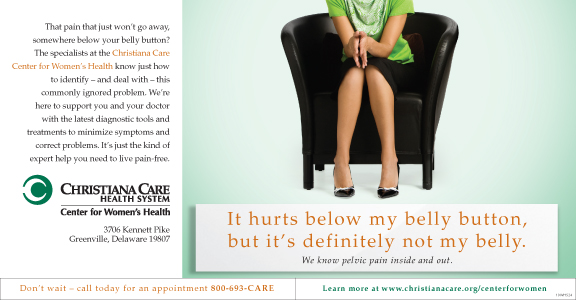You Don’t Have To Live With Genital Itching. Your Christiana Care Gynecologist Can Help

By Susan A. Kelly, M.D.
Many women may experience annoying itching — and you don’t have to wait until your annual exam with your gynecologist to get help.
Itching is not normal. You should not put up with the discomfort.
Think of it this way. If you had one spot on your arm that itched every day, you would go to your doctor, right? The same should be true of your personal area.
Our bodies contain lots of different bacteria that are supposed to be there and serve a useful purpose, including bacteria that live in the vagina. But sometimes the good bacteria are crowded out by invading bad bacteria, resulting in an infection. That often happens when we are taking antibiotics.
Any change in your normal ecosystem can increase your risk of infection, as does the use of steroids, a diagnosis of diabetes, and having multiple sex partners. Even a single partner who has an infection can pass it on to you.
Itching can result from infections caused by bacteria, viruses, or yeast, and also skin conditions and even cancer.
Help for common infections
One of the most common is bacterial vaginosis, which causes discharge and an unpleasant, fishy odor, and occasionally also itching.
Another common cause is yeast infection. Pregnant women can get yeast infections, although it can occur at any time, especially in women who have problems with their immune system.
Yeast infections can cause itching and often a white, clumpy discharge. Your doctor can confirm a yeast infection by taking a tiny sample and looking at it under the microscope.
Over-the-counter creams work well in treating some yeast infections and may be an option for women who are familiar with yeast symptoms. But the creams don’t cure some forms of yeast and do not treat other infections. So, if you aren’t feeling better in a few days, see your doctor.
Chlamydia, a common sexually transmitted disease (STD), can cause a heavy discharge, pain during urination or sex — or no symptoms at all. If it isn’t treated, chlamydia can spread to the uterus and fallopian tubes and in some cases can make a woman infertile. So if you have more than one partner or a new partner, let your doctor know so you can be screened for the disease.
Genital warts is a common STD, especially in younger women. About 6 percent of women aged 20-34 have genital warts. While not dangerous, these can be bothersome and can cause irritation. Genital warts can generally be treated with topical medications, or with simple technology in the office.
Herpes, a very contagious STD, creates painful ulcers that can last for up to three weeks and can be passed on to a baby during a vaginal delivery. That is why doctors often recommended a Cesarean section if a woman has active herpes at the time of labor.
The virus can come back from time to time or never resurface. If your herpes returns be sure to tell your doctor because prescription medications can stop outbreaks or make them not as severe. Learning about your potential to infect your partner is an important conversation to have with your physician.
Often, women experience itching and soreness around menopause, when the body’s levels of the hormone estrogen drop off. Many women find they have lost the ability to lubricate, which may make it painful to have sex.
Topical estrogen — a form of the hormone that is applied to the genital or vaginal skin instead of taken by mouth — works to make the lining of the vagina less fragile. Because the dose is low and the cream is spread on a small area it doesn’t appear to have many of the risks associated with the side effects of estrogen pills.
Itching has many causes, which is why you need a doctor to find out why. That urge to scratch might be caused by eczema, skin conditions that are found more commonly on other parts of the body. Sometimes, the cause is in our environment. You may be sensitive to soap, bubble bath or personal hygiene wipes.
Good habits make a big difference in preventing itching. After you go to the bathroom, wipe from the front toward the back. Avoid tight pants and undergarments in fabrics that don’t breathe. Wash your clothing in detergent that doesn’t include perfumes or dyes.
Above all, don’t delay in seeking attention for pain, discharge or itching. Many symptoms can be easily treated.
For relief from itching, seek treatment right away.
Susan A. Kelly, M.D., is certified by both the National Board of Medical Examiners and the American Board of Obstetrics and Gynecology and has a special interest in the health of the vulva and vagina. To make an appointment:
Smyrna Health & Wellness Center
100 S. Main Street, Suite 215
Smyrna
302-659-4520
Christiana Women’s Health
Christiana Hospital, Women’s Health Building
Suite 1900
4755 Ogletown-Stanton Road, Newark
302-733-6510


